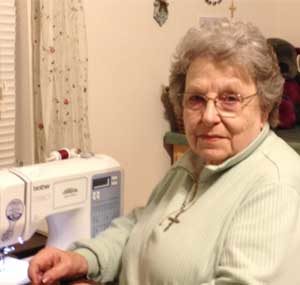
With her vision restored by cornea transplantation, Dorothy is able to continue volunteering for her local hospital.
Dorothy was born and raised in Washington, Missouri. Not only has she lived her entire life in Washington, but she spent a considerable portion of her time working in the town’s hospital, what is today known as Mercy Hospital Washington. Dorothy first worked as a nurse’s aide during World War II and later went on to become the hospital’s executive housekeeper for 28 years. In fact, she even met her husband of 68 years through the hospital.
“I met [my husband’s] mother at the hospital, and he was in the service,” Dorothy said. “She asked me to start writing to him, so I did and now we’re still married.”
It comes as no surprise then that, after her retirement, Dorothy has stayed involved with the hospital as part of the auxiliary club. But what did come as a surprise was her rapidly failing eyesight a few years ago. “I had to use magnifying glasses just to read, which was strange because I hadn’t had a problem before,” said Dorothy. “It kept getting worse and worse, so I got stronger magnifying glasses.” When she could no longer find a magnifying glass strong enough to help her read, she visited a doctor. “He said my eyesight was really bad and asked if I wanted to keep seeing my grandchildren,” she said. Dorothy was diagnosed with Fuchs’ dystrophy, a disease that causes an inner part of the cornea to blister and cloud. “The doctor said I needed corneal transplants,” she said. “I wasn’t ready for that, but if I waited any longer, I’d be blind.”
Dorothy visited Dr. Fedyk, an ophthalmologist in St. Louis, who performed a few laser surgeries first to try to fix her vision without transplantation. But eventually it became clear that Dorothy would have to undergo corneal transplant surgery. “I was upset about it, but I knew I wouldn’t be able to see otherwise,” said Dorothy. “Dr. Fedyk scheduled the appointments, and I just did exactly what he said to a T and it was really good. You have to have patience and do what you’re told. The hospital was great, everything was so perfect for me.”
The corneal transplant surgeries were successful. “After I could see, it was amazing,” said Dorothy. “It was like a gift—well, it was a gift from the people who donated the corneas.” Because of her many years of experience in a hospital, Dorothy understood that her transplant tissues were donated by other people who chose to be donors when they passed away. “After my transplant experience and knowing other people’s experiences, I just think it’s a blessing that people will donate organs and tissues,” she said. “At first I couldn’t understand it, but then I saw how donation helps people so I think it’s wonderful. I can’t believe how it’s helped me. I want to encourage more people to donate.”
Dorothy has reported having terrific vision and can even read without glasses. “Before, there was a film over everything,” Dorothy remembered. “It was like walking in a fog–everything was blurred. I used to love to read and got upset when I couldn’t.” Thanks to two heroic cornea donors, Dorothy can see well again and read comfortably. “I can’t believe how much I was missing,” she said. “The colors are just beautiful, it gives you a beautiful outlook on life. I enjoy seeing people clearly again.” These days, Dorothy puts her renewed vision to good use by volunteering her time for the hospital. In fact, her sight is so good that she sews pillows for the maternity ward at Mercy Hospital Washington and makes tote bags for people who use a wheelchair or walker. “Life is busy, but I love it,” she said. “Everything is so beautiful and bright now.”
Join the millions of Americans who have said “yes” to helping people like Dorothy get sight-saving transplants. Sign up for the donor registry online at Donate Life America or at your local Department of Motor Vehicles office. And be sure to share your decision with your family.

